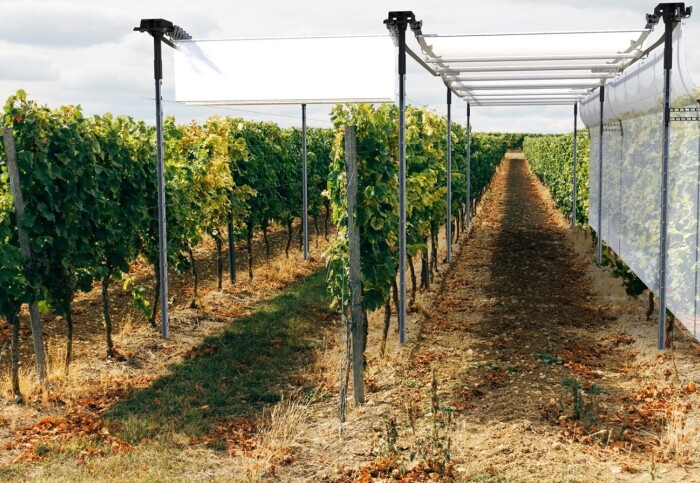Innovating for the UK Wine industry with NIAB and Imperial

Researchers from Design Engineering, Center for Environmental Policy and NIAB are advancing sustainability and innovation in UK viticulture.
The UK wine industry has undergone significant transformation over the past two decades, whereby the production of grapes (viticulture) for wine production was as of 2023 one of the fastest growing agricultural sectors in the country. In fact, grapes currently represent 36% of England’s small fruit crop production. However, the industry faces several key challenges, including adapting to climate change and developing sustainability practices. In response, UK winegrowers and winemakers have demonstrated remarkable openness to innovation and a commitment to sustainability. Imperial College London and NIAB’s Wine Innovation Centre, home of UK viticulture and oenology research, are collaborating on several research projects, which aim to contribute to a resilient, sustainable and innovative UK wine industry.
Ebba Engström, PhD candidate at the Centre for Environmental Policy funded by the Science and Solutions for a Changing Planet (SSCP) DTP, is exploring knowledge management related to green infrastructure in the UK viticulture. Green infrastructure encompasses non-vine vegetation elements, water bodies, and structures such as nest boxes which are human-made/human-constructed. They are purposefully kept in vineyards to provide benefits for environment and the production system.
"As the UK wine industry grows, it's crucial to prioritise sustainability. Green infrastructure can play a key role. Viticulturists therefore need further information on green infrastructure benefits, limitations, and management applicable to their contexts. To ensure successful knowledge transfer, we need a better understanding of the knowledge systems around green infrastructure in UK viticulture,” Ebba Engstrom

While climate change is predicted to increase the opportunities for growing commercially popular grape varieties, uncertainties remain about its effects and impacts on grape growing. However, many challenges continue to pose a threat to the industry – such as the risk of frost damage. To prevent frost damage, there are various solutions available on the market, including wind machines, irrigation lines, and bougie candles, though each of these has their own limitations and no single solution fits all. This has spurred the development of additional innovations in the area, including thermostatic foams and root extract sprays.
Frost events can have a devastating impact on the grape harvest, and I wanted to create an economical and environmentally friendly system, that is easy to deploy through integration with existing infrastructure, Maximilian Matthews Design Engineering (MEng) student
Design Engineering (MEng) student Maximilian Matthews developed VineShield - a retractable blanket system that as a modular unit can be added onto existing trellis infrastructure, to prevent the formation of radiation frost around the grapevines. It works by trapping heat near the ground, creating a warmer microclimate underneath the blanket. The development of VineShield took inspiration from the ‘frost blankets’ used by the French winegrower, Loic Pasquet.
VineShield marks the first collaborative project carried out in partnership with Dr Belinda Kemp at NIAB’s Wine Innovation Centre. NIAB’s expertise lies within crop science, and the Wine Innovation Centre is focused on applied viticulture and wine science, so collaborating with Imperial on design and engineering challenges provides a diverse range of technological solutions for UK vineyards and wineries.
This exciting collaboration with NIAB will drive vineyard and winery innovations by utilising the skills, expertise and knowledge of NIAB and Imperial scientists Dr Belinda Kemp Head of Viticulture & Oenology research at NIAB
The value of cross-collaborations between NIAB’s Wine Innovation Centre and Imperial, is further demonstrated through Vinayak Gupta’s project focused on the valorisation of winemaking waste for textile products. Vinayak (Fellow of the Imperial-Tokyo Tech Global Fellows Programme) spent three months at the Dyson School of Design Engineering. During this time, he created a range of vegan leathers from grape pomace, a waste material from winemaking.

As the viticultural and wine sector in the UK grows, there is a need for diverse research to be devoted to it, which harnesses interdisciplinary skills and viewpoints.
“Through interdisciplinary collaboration and a commitment to excellence in research, these future endeavours aim to drive positive change within the wine industry, fostering resilience, sustainability, and growth for vineyards and communities alike,” Dr Elena Dieckmann, Lecturer, Dyson School of Design Engineering.
This work was enabled through support from Dr Belinda Kemp at NIAB. In case you have feedback or questions, feel free to contact max.matthews20@imperial.ac.uk
Article text (excluding photos or graphics) © Imperial College London.
Photos and graphics subject to third party copyright used with permission or © Imperial College London.
Reporter
Ebba Engstrom
Centre for Environmental Policy
Dr Elena Dieckmann
Dyson School of Design Engineering
Sanjana Kakar
Department of Materials